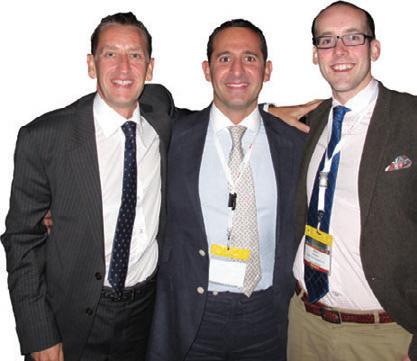14891 RGS ONA Magazine 88_PRINT 20/05/2013 15:40 Page 10
A HISTORY OF THE RGS IN TEN PEOPLE The search by David Goldwater (51-62) for 10 people who have been most influential in the history of the school continues. The response to my request for ‘reader participation’ has produced an absolutely overwhelming response and it has given me a real problem how to progress (even conclude!) this series of articles. Because so many reminiscences concerned the influence and guidance given by Jack Wolstenholme, Director of Music from 1948 until 1975, this piece concentrates solely on him. Miss (Ma) Jean Steven, who filled hungry boys’ bellies from 1931 until the mid-50s will just have to stay in the Kitchen until the next magazine and maybe more ONs Jack Wolstenholme, 1984.
can send some recollections of her to the ONA development office (see Contents page for contact details). A picture would be very welcome. Is it too irreverent to imagine her on some ethereal plane, serving a delicious lunch to Jack and ordering him to “eat it up and don’t grouse”? As Orsino linked music and food in Twelfth Night, we will ‘play on’ – she and other iconic characters who colour the RGS’s historical kaleidoscope will have to wait. As I wrote previously, this will run and run!
Jack Wolstenholme Stuart Armstrong (46-54) writes: I
had been in the school for a couple of years when Jack arrived to replace Arthur Milner. I was in the Senior Choir under Mr Milner, and what a contrast in personality and styles! We wouldn't have dreamed of calling Mr Milner “Arthur” when discussing him, but we thought of his successor as ‘Jack’ from the first. Mr Milner was urbanity personified, whereas Jack was a ‘rough diamond’ – well bluff, but certainly a diamond. Let me pick out just a few of the highlights for me. While in his music class (and still a treble) I innocently asked him what “soprani castrati” were. I got the right answer, but with the gory details glossed over. Perhaps the orchestral repertoire was less adventurous. Jack inherited a strong tradition, including participation by some Masters, and regular opportunities for young instrumentalists to ‘star’ in a concerto, and he was glad to build on that. I was never a ‘star’, but got as far as Principal Second Violin. There were limits to what was acceptable. Dennis Walton (44-52) went ahead despite a warning that a Jazz piece for clarinet as an entry in the House Music Competition wouldn’t be well received. He was duly awarded ‘nul points’. We knew Jack as a great character and a great asset to the school. None of us left our seats at the end of a City Hall Speech Day until he had finished his ‘tour de force’ on the large organ there, Widor’s Toccata. I’m so glad to have known him. Mike Oswald (staff 1966-2003)
remembers Jack Wolstenholme saying shortly after he retired: “The best thing about retirement is the free period after lunch!” I’m now in a position to concur! Melvyn Wallhead (56-66): Jack
collared me in the Hall, ‘inviting’ me to Saturday detention. He was affronted by me failing to answer any of his test questions correctly, except the identification of the National Anthem (I was learning the guitar at the time and at least I knew that). I think it was the first Speech Day at City Hall, in the 1960’s when Phantom of the Opera
10




